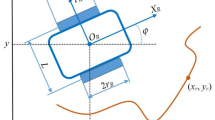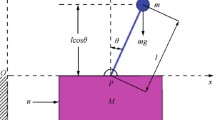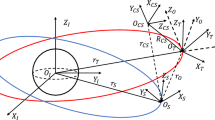Abstract
This paper presents a robust nonlinear controller design approach for uncertain quadrotors to implement trajectory tracking missions. The quaternion representation is applied to describe the rotational dynamics in order to avoid the singularity problem existing in the Euler angle representation. A nonlinear robust controller is proposed, which consists of an attitude controller to stabilize the rotational motions and a position controller to control translational motions. The quadrotor dynamics involves uncertainties such as parameter uncertainties, nonlinearities, and external disturbances and their effects on closed-loop control system can be guaranteed to be restrained. Simulation results on the quadrotor demonstrate the effectiveness of the designed control approach.
Similar content being viewed by others
References
Hoffmann G M, Huang H, Waslander S L. Precision flight control for a multi-vehicle quadrotor helicopter testbed. Control Eng Pract, 2011, 19: 1023–1036
Sun C H, Duan H B. Markov decision evolutionary game theoretic learning for cooperative sensing of unmanned aerial vehicles. Sci China Technol Sci, 2015, 58: 1392–1400
Tang S, Yang Q H, Qian S K, et al. Height and attitude active disturbance rejection controller design of a small-scale helicopter. Sci China Inf Sci, 2015, 58: 032202
Alexis K, Nikolakopoulos G, Tzes A. Switching model predictive attitude control for a quadrotor helicopter subject to atmosphere disturbances. Control Eng Pract, 2011, 10: 1195–1207
Pounds P, Mahony R, Corke P. Modelling and control of a large quadrotor robot. Control Eng Pract, 2010, 18: 691–699
Mahony R, Kumar V, Corke P. Multirotor aerial vehicles: modeling, estimation, and control of quadrotor. IEEE Robot Automat Mag, 2012, 19: 20–32
Castillo P, Dzul A, Lozano R. Real-time stabilization and tracking of a four-rotor mini rotorcraft. IEEE Trans Control Syst Technol, 2004, 12: 510–516
Aguilar-Ibanez C, Sira-Ramirez H, Suarez-Castanon S, et al. The trajectory tracking problem for an unmanned four-rotor system: flatness-based approach. Int J Control, 2012, 85: 69–77
Bertrand S, Guenard N, Hamel T, et al. A hierarchical controller for miniature VTOL UAVs: design and stability analysis using singular perturbation theory. Control Eng Pract, 2011, 19: 1099–1108
Besnard L, Shtessel Y B, Landrum B. Quadrotor vehicle control via sliding mode controller driven by sliding mode disturbance observer. J Franklin Inst, 2012, 349: 658–684
Luque-Vega L, Castillo-Toledo B, Loukianov A G. Robust block second order sliding mode control for a quadrotor. J Franklin Inst, 2012, 349: 719–739
Dydek Z T, Annaswamy A M, Lavretsky E. Adaptive control of quadrotor UAVs: a design trade study with flight evaluations. IEEE Trans Control Syst Technol, 2013, 21: 1400–1406
Zuo Z Y. Trajectory tracking control design with command-filtered compensation for a quadrotor. IET Control Theory Appl, 2010, 11: 2343–2355
Ryan T, Kim H J. LMI-based gain synthesis for simple robust quadrotor control. IEEE Trans Automat Sci Eng, 2013, 10: 1173–1178
Liu H, Li D J, Xi J X, et al. Robust attitude controller design for miniature quadrotors. Int J Robust Nonlinear Control, 2016, 26: 681–696
Liu H, Lu G, Zhong Y S. Robust LQR attitude control of a 3-DOF lab helicopter for aggressive maneuvers. IEEE Trans Ind Electron, 2013, 60: 4627–4636
Tayebi A, McGilvray S. Attitude stabilization of a VTOL quadrotor aircraft. IEEE Trans Control Syst Technol, 2006, 14: 562–571
Johnson E N, Kannan S K. Adaptive trajectory control for autonomous helicopters. J Guid Control Dyn, 2005, 28: 524–538
Zhang R, Quan Q, Cai K Y. Attitude control of a quadrotor aircraft subject to a class of time-varying disturbances. IET Control Theory Appl, 2011, 5: 1140–1146
Isidori A, Marconi L, Serrani A. Robust nonlinear motion control of a helicopter. IEEE Trans Automat Control, 2003, 48: 413–426
Guerrero-Castellanos J F, Marchand N, Hably A, et al. Bounded attitude control of rigid bodies: real-time experimentation to a quadrotor mini-helicopter. Control Eng Pract, 2011, 19: 790–797
Li K B, Chen L, Tang G L. Algebraic solution of differential geometric guidance command and time delay control. Scie China Technol Sci, 2015, 58: 565–573
Guo S P, Li D X, Meng Y H, et al. Task space control of free-floating space robots using constrained adaptive RBF-NTSM. Sci China Technol Sci, 2014, 57: 828–837
Shen Y Y, Wang Y Q, Liu M L, et al. Acquisition algorithm assisted by AGC control voltage for DSSS signals. Sci China Technolog Sci, 2015, 58: 2195–2206
Wang H X, Wang W Y, Zheng Y H. Bifurcation analysis for Hindmarsh-Rose neuronal model with time-delayed feedback control and application to chaos control. Sci China Technol Sci, 2014, 57: 872–878
Derafa L, Benallegue A, Fridman L. Super twisting control algorithm for the attitude tracking of a four rotors UAV. J Franklin Inst, 2012, 349: 685–699
Xu R, Ozguner U. Sliding mode control of a class of underactuated systems. Automatica, 2008, 44: 233–241
Zhao B, Xian B, Zhang Y, et al. Nonlinear robust sliding mode control of a quadrotor unmanned aerial vehicle based on immersion and invariance method. Int J Robust Nonlinear Control, 2015, 18: 3714–3731
Liu H, Li D J, Zuo Z Y, et al. Robust three-loop trajectory tracking control for quadrotors with multiple uncertainties. IEEE Trans Ind Electron, 2016, 63: 2263–2274
Liu H, Wang X F, Zhong Y S. Quaternion-based robust attitude control for uncertain robotic quadrotors. IEEE Trans Ind Inform, 2015, 11: 406–415
Liu H, Zhao W B, Zuo Z Y, et al. Robust control for quadrotors with multiple time-varying uncertainties and delays. IEEE Trans Ind Electron, 2016, doi: 10.1109/TIE.2016.2612618
Stevens B L, Lewis F L. Aircraft Control and Simulation. New Jersey: John Wiley & Sons, Inc., 2003
Author information
Authors and Affiliations
Corresponding author
Rights and permissions
About this article
Cite this article
He, T., Liu, H. & Li, S. Quaternion-based robust trajectory tracking control for uncertain quadrotors. Sci. China Inf. Sci. 59, 122902 (2016). https://doi.org/10.1007/s11432-016-0582-y
Received:
Accepted:
Published:
DOI: https://doi.org/10.1007/s11432-016-0582-y




